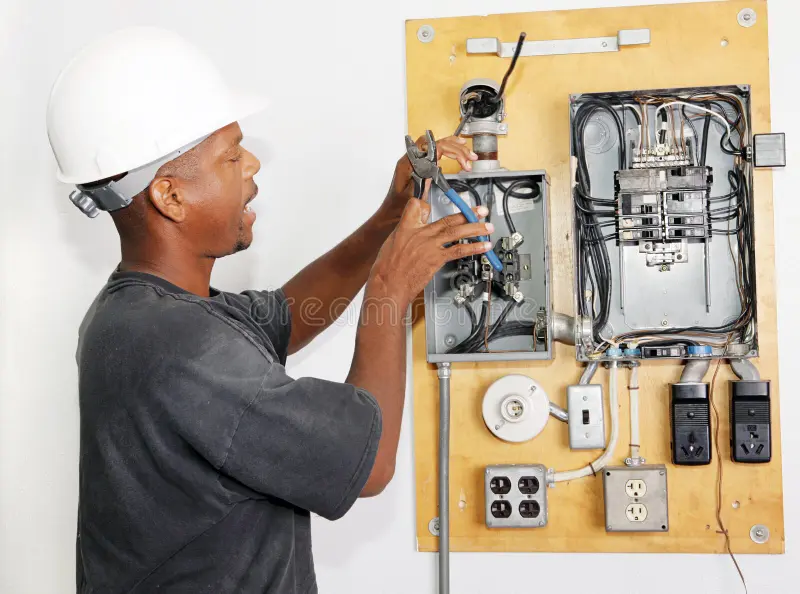Ensuring Safety: Standards and Regulations in Electrical Work by Electricians
by siteadmin

Electrical work is an integral part of modern construction and maintenance, but it also carries inherent risks if not performed safely and according to established standards and regulations. Electricians play a critical role in ensuring the safety of electrical installations by adhering to industry standards and regulations that govern their work. In this blog post, we’ll explore the importance of safety standards and regulations in electrical work and how electricians uphold these standards to protect lives, property, and the environment.
Importance of Safety Standards:
Safety standards in electrical work serve as guidelines and benchmarks for ensuring the safe design, installation, operation, and maintenance of electrical systems. These standards are developed and maintained by organizations such as the National Electrical Code (NEC), the International Electrotechnical Commission (IEC), and the Institute of Electrical and Electronics Engineers (IEEE). Compliance with safety standards helps mitigate electrical hazards, reduce the risk of accidents and injuries, and promote uniformity and consistency in electrical practices.
Regulatory Compliance:
In addition to safety standards, electricians must comply with regulatory requirements established by local, state, and national authorities. These regulations govern various aspects of electrical work, including licensing and certification, permits and inspections, wiring methods, equipment standards, and worker safety. Regulatory bodies such as the Occupational Safety and Health Administration (OSHA) in the United States and the Health and Safety Executive (HSE) in the United Kingdom enforce these regulations to ensure workplace safety and protect the public from electrical hazards.
Training and Certification:
To perform electrical work safely and competently, electricians undergo rigorous training and certification programs that cover electrical theory, practical skills, and safety practices. Electricians must obtain proper licensing and certification from recognized authorities to demonstrate their qualifications and competence in the field. Ongoing professional development and continuing education are essential for electricians to stay abreast of industry advancements, new technologies, and changes in safety standards and regulations.
Risk Assessment and Hazard Mitigation:
Before undertaking any electrical work, electricians conduct thorough risk assessments to identify potential hazards and implement appropriate mitigation measures. This includes assessing the electrical load, identifying potential sources of electrical shock, arc flash, and fire hazards, and implementing safety precautions such as lockout/tagout procedures, personal protective equipment (PPE), and proper insulation and grounding techniques. By proactively addressing safety risks, electricians minimize the likelihood of accidents and injuries on the job.
Quality Assurance and Inspection:
Quality assurance and inspection processes are integral to ensuring that electrical installations meet safety standards and regulatory requirements. Electricians perform comprehensive inspections and testing of electrical systems to verify compliance with applicable codes and standards, identify deficiencies or non-compliance issues, and rectify any deficiencies before commissioning the system. Additionally, regulatory authorities conduct periodic inspections of electrical installations to ensure ongoing compliance with safety standards and regulations.
Safety standards and regulations play a vital role in guiding and governing electrical work performed by electricians. By adhering to established safety standards, complying with regulatory requirements, undergoing comprehensive training and certification, conducting risk assessments, and implementing quality assurance measures, electricians uphold the highest standards of safety and professionalism in their work. By prioritizing safety and compliance, electricians protect lives, property, and the environment, ensuring the integrity and reliability of electrical installations for generations to come.
Electrical work is an integral part of modern construction and maintenance, but it also carries inherent risks if not performed safely and according to established standards and regulations. Electricians play a critical role in ensuring the safety of electrical installations by adhering to industry standards and regulations that govern their work. In this blog post,…
Recent Posts
- Powering Proficiency: Training and Education for Electricians
- Powering the Future: Emerging Technologies in the Electrical Industry
- Ensuring Safety: Standards and Regulations in Electrical Work by Electricians
- Troubleshooting Demystified: Common Issues of Electric Panels
- Demystifying Electric Panels: Understanding Their Components
